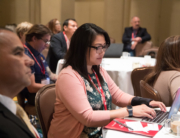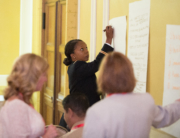March is Social Work Month and Carl Castro, associate professor and director of the Military and Veterans Programs at the USC Suzanne Dworak-Peck School of Social Work, discusses what makes the USC military social work program so unique and why it’s important—now more than ever—to keep building the ranks of behavioral health providers with competent individuals who can effectively treat service members, veterans and their families.
Below are some highlights from the audio:
On the importance of military social work after almost two decades of conflict:
Seventeen years. Millions of service members is what we’re talking about and we are nowhere even meeting the needs of those millions of veterans and their family members who have actually served over that 17 year period. We’ve made tremendous progress, tremendous strides in increasing the workforce to be able to understand these veterans and their families and the challenges they have in the support they need, but we’re not even close to meeting the actual real needs that they have.
On the similarities of veteran experiences across the nation and the world and how that influences the military social work curriculum:
One of the things we’re very sensitive to, and a lot of the things the research has shown, is that many of the challenges that we face here in America, other countries face. Canada, Australia, Britain, the Netherlands, Estonia, France, Germany. These are not unique experiences that American service members are having. These are common experiences that all military personnel and their families experience … Sure, there’ll be national and cultural differences, but the fundamental needs of the service member and their veterans cross all of these nations and all of these militaries and that’s why we’ve worked so hard here in the center to focus not only on best practices but evidence-based practices from these other nations that we could also incorporate into our own curriculum as we educate and train our military social workers.
On why military cultural competency is key to successful social workers:
Many folks do not appreciate that the military is a unique culture in how things get organized: the language people use, the way people communicate with each other, what they wear, where they live, how they think about problems. It’s a different culture than the American culture.
As service members leave the military for a new civilian life, their experiences mimic those of immigrants:
We don’t think of our veterans as immigrants, but for all practical purposes, they are… to include their social identity, their social environment, who their friends become. They’re leaving all of their friends behind in the military. They need to make new friends, have to have a new identity that’s oriented around their new civilian occupation, their new civilian community they’re living in and some veterans struggle in that transition.








